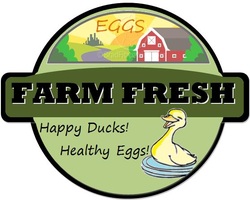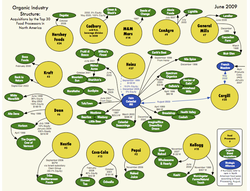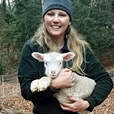
I've been asked by folk outside of my normal "crunchy" community, "why would people buy your farm products if you're not certified organic when they can get organic products at Walmart or the supermarket?"
That's a perfectly legitimate question and actually reminds me to put myself in an average consumers shoes. Most of the folks I spend time with are other small farmers or conservation minded people like me (AKA "crunchy") and I forget that not everyone subscribes to Mother Earth News or has slowfoodusa.org bookmarked.
It's true, I'm not certified organic. The fact is, it would cost me nearly $1000 for that certification and I will never, ever sell enough surplus to justify the cost of a buzz-word endorsement from the USDA.
I raise my animals primarily for my own consumption and enjoyment (I love those silly birds!). I was tired of not knowing what, when and where my food was coming from and it doesn't get more local than my own backyard. I only sell a portion of what I raise in an effort to provide my friends and neighbors with wholesome food and hopefully to offset my management cost a little. Raising 20 vs raising 40 roasters is just about the same amount of work. Honestly, I make no profit at all on my little side business, especially since I charge less than the big corporate organics. My sole profit is knowing I'm doing the right thing for me, the animals I raise, and by spreading that out a tiny bit within my own community by selling at a wholesale price. And my local demand still outpaces - by a wide margin - my ability to produce on my small scale (it's a one-woman show, for goodness sake).
Here's why other small, local farms and I have loyal customers: "Organic" in corporate agribusiness is a big.. fat.. lie.
.
.
These big corporations have even put educated consumers in a chokehold because they command an army of lobbyists for their agribusiness that have managed to get laws changed that define what "organic" means. The USDA is currently allowing more than 500 synthetics legalized by a rider to the FY06 Agriculture Appropriations Bill. Here's the really sneaky part: These are exempt from listing on ingredient labels and exempt from review or approval by the National Organic Standards Board. What??? But why the subterfuge? I mean, how will you know what you're feeding your kids? Yeah, you guessed it... some of these things are toxins, like dimethyl dicarbonate, an antimicrobial added to fruit juices (even those that say "100 percent juice"); and a scary substance containing methyl chloride, a flammable gas once used as a refrigerant and is classified as an "endocrine disruptor". Ack!
But organic isn't just about keeping out chemicals - don't get me wrong... that's very important - but it's also about animals raised ethically and in an environmentally sound manner. This is the thing that matters most to your local smallholder - we LOVE our animals and most often put their care first because we don't ever want to see them at a disadvantage as the responsible caretaker (my motto is "my animals first, me second"). But these giant corporate farms don't do a good job at the humane management of animals either.
Let's just look at dairy, for instance:
Organic free-range eggs, to the average consumer, conjures up images of chickens running freely in a field pecking about for worms and bugs. But big agribusiness considers (with USDA backing) free-range for their chickens to mean a tiny enclosed concrete porch that is *possibly* accessible to about 4% of their literally thousands of closely confined hens. Uh... this is hardly free-range, fellas.
Organic milk is one of those agricultural products for which demand outpaces supply. When you put a carton of Horizon or Aurora organic milk in your shopping cart you probably have an idyllic vision of cows grazing on open fields under blue skies... but this is nothing close to the truth. You simply can't say your 3,000-4,000 cows have reasonable access to pasture when your facility has no functional pasture. A narrow strip outside of the feedlot building where they're confined sprinkled with straw isn't anybody's idea of pasture except, of course, the USDA. C'mon now, guys!
Now, tell me, would you rather eat eggs laid by my 9 little chickens and 20 funny ducks running free and creating all sorts of merry mayhem or take your chances on those prettily packaged brown eggs at the grocery store? Yeah, me too.
Of course, this would have never happened if organic food hadn't become a capricious money maker for fakers. Does organic command higher prices? Yes, because it costs small farms so much more to produce (and pay for certification that used to mean something). But the waters have been muddied by giant corporations who can afford to have the certification allowances changed to enable them to raise thousands of animals in the same unethical, profitable way they always did but still slap that money making USDA label on their product. Unfortunately, it costs the small, enthusiastic farmer a lot of capital to get the same (diluted) organic label.

If you care, like I do, about whose big, fat thumb is in the organic pie you can take a look at this very interesting organics family tree. Organics is now "owned" by corporate America and I think we all know the implications.
Please, please find local folks in your area who are raising their animals right and letting them live a happy and humane existence and give those farmers, CSA's, and backyard hobbyist your business. Then you'll know you're putting the good stuff in your body. It's worth driving a couple of miles out of your way. And if you live near me you can just make it all so much easier on yourself by joining forces with Miss Zoa at La Plata Area Foods, she'll pick up your local, naturally grown foods and deliver them right to your door: laplata-area-food.blogspot.com, thus assisting you in reducing your carbon footprint while you support local sustainable agriculture. But if you're gonna buy organic eggs in the supermarket, vote with your fork and be an informed consumer. Check the scorecard first.
Ahem... I will now dismount my soapbox. Well, after you read the following news alert:
The following is reprinted from cornucopia.org:
Organic Egg Business Being Hijacked by Corporate Agribusinesses — Help Reverse this Scandal!
September 26th, 2010
Imagine 80,000 laying hens in a single building, crowded in confinement conditions, on “farms” with hundreds of thousands or a million birds. Is that organic?
How about a tiny enclosed concrete porch, accessible by only 3%-5% of the tens of thousands of birds inside a henhouse. Does that pass as outdoor access as required by federal organic law?
Industrial-scale egg producers are gaming the system, producing “organic” eggs in huge factory farms, crowding tens of thousands of chickens in two-story buildings with small porches passing as “outdoor access.”
Some of the factory farms don’t even bother with the phony-baloney porches—they have notes from their veterinarian saying (and we wish we were making this up), “Don’t let your birds outside; it would be hazardous to their health.”
These industrial-scale producers, with their livestock management shortcuts, are placing family-scale organic farmers at a competitive disadvantage in the marketplace. Some pasture-based organic farmers have already been driven out of the organic egg business.
The organic community has an opportunity to reverse this scandal and support authentic organic agriculture. The USDA’s National Organic Standards Board (NOSB) will be debating the meaning of outdoor access and stocking densities for organic poultry and other livestock at the upcoming meeting in Madison, Wis., October 25-28.
The NOSB’s Livestock Committee has already submitted a proposal that would require at least two square feet of outdoor space per bird—a proposal that is vehemently opposed by industrial-scale producers whose tiny porches would no longer pass as legitimate outdoor access under this new rule.
The USDA is hearing from the well-funded and organized industry lobbyists. We must ensure that they also hear from the organic community!
Meeting October 25-28, 2010 in Madison, Wisconsin. Attend or mail in your proxy letter ASAP!
http://www.cornucopia.org/2010/09/organic-egg-business-being-hijacked-by-corporate-agribusinesses-help-reverse-this-scandal/


 RSS Feed
RSS Feed



